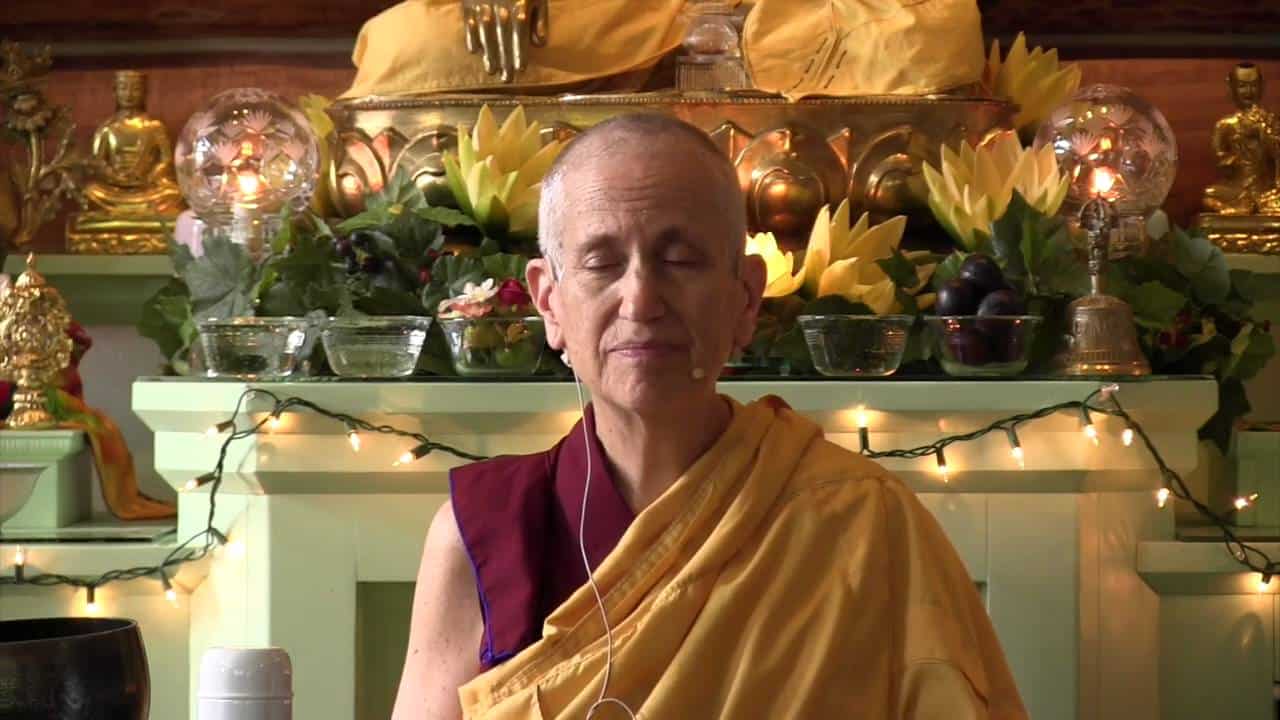The 37 harmonies with awakening, part 2
The text turns to training the mind on the stages of the path shared with intermediate level practitioners. Part of a series of teachings on the Gomchen Lamrim by Gomchen Ngawang Drakpa. Visit Gomchen Lamrim Study Guide for a full list of contemplation points for the series.
- Review of the first part of the 37 harmonies
- The seven awakening factors
- The noble eightfold path according to the Sanskrit tradition
- Practicing the noble eightfold path in daily life
Gomchen lamrim 56: The 37 harmonies, part 2 (download)
Contemplation points
Seven Awakening Factors
Practice of the Seven Awakening Factors is for Middle Level Practitioners intent on liberation (and those practicing in common with it). Consider each of the seven and how they build from one to the next, guiding our minds to the state of liberation:
- Mindfulness: helps the mind stay on the object of meditation and helps subdue the gross afflictions.
- Discrimination of phenomena: a form of wisdom that knows what to practice and what to abandon on the path.
- Effort: the energy we put into our practice.
- Rapture: a state of supreme joy that floods the body when you have single pointed concentration.
- Pliancy: the ability to put the mind on whatever object you wish.
- Concentration: the ability to keep the mind on whatever object you wish.
- Equanimity: the mind abiding in a neutral feeling.
Noble Eightfold Path
Practice of the Noble Eightfold Path is for Middle Level Practitioners intent on liberation (and those practicing in common with it). Consider each of the eight and how you can practice it in your daily life right now.
- Right view: for where WE are on the path, this is about having the right view of conventional reality (karma, rebirth, the Buddhist worldview). Why is it so important to start out with right view and put our energy and time into developing it?
- Right intention: Venerable Chodron listed three parts to right intention: 1) renunciation, 2) benevolence, and 3) compassion.
- With renunciation, it is not giving up happiness, but rather giving up the distraction and misery that is our obsession with sensual desire. What kinds of sensual desire do you get caught up in that distract you from practice?
- Benevolence makes us look at how we approach the world. Do you look on others with kindness, or do you tend to see them with suspicion, competition/judgment, or how you might be able to get something from them? What can you do to transform these negative attitudes to ones of kindness. Think of situations in your own life and how you might think differently in the moment that might change the experience.
- With compassion we really start reaching out to reduce the suffering of others. Where have you made effort in this area? Where do you struggle with this? What can you do to grow your compassion?
- Right speech: Our speech is incredibly powerful. Consider your speech with friends, family, strangers… What motivates your speech? In terms of lying, divisive speech, harsh speech, and idle talk, are you aware of what you are saying and how it affects others? What can you do to be more aware of your speech and to focus it on what is beneficial?
- Right action: This is about refraining from actions that harm ourselves and others (namely killing, stealing, and unwise and unkind sexual behavior). Consider what you read/see in the news and the drama that affects your own life and the lives of those around you. Do you see how these are the root of so much suffering in our lives? Make a determination to refrain from them.
- Right livelihood: For the lay practitioner, this is about being honest in your work and not harming others through it. If you’re a monastic, it’s about refraining from the 5 wrong livelihoods. Think of examples of wrong livelihood that you have performed or witnessed in the world around you. How has this brought harm to yourself or others?
- Right effort: This is about putting effort into doing our practices and not keeping ourselves busy doing things of no consequence. Are there things you do regularly that distract you from spiritual practice? Consider the many benefits of spiritual practice and the disadvantages of not practicing as a means to increase your energy for it.
- Right mindfulness: This is about being mindful of our precepts and values and living according to them. Think of times where your precepts and values were very clear in your mind and helped you to avert creating non-virtue. Then think of times you created non-virtue because you were not holding them in mind. How did you feel in each situation? What can you do to continually keep your precepts and values in mind so that they influence your daily life?
- Right concentration: this is about training the mind to being single pointed. It takes time, effort and a special environment. What can you do to help create the causes for this in your life?
Venerable Thubten Chodron
Venerable Chodron emphasizes the practical application of Buddha’s teachings in our daily lives and is especially skilled at explaining them in ways easily understood and practiced by Westerners. She is well known for her warm, humorous, and lucid teachings. She was ordained as a Buddhist nun in 1977 by Kyabje Ling Rinpoche in Dharamsala, India, and in 1986 she received bhikshuni (full) ordination in Taiwan. Read her full bio.


